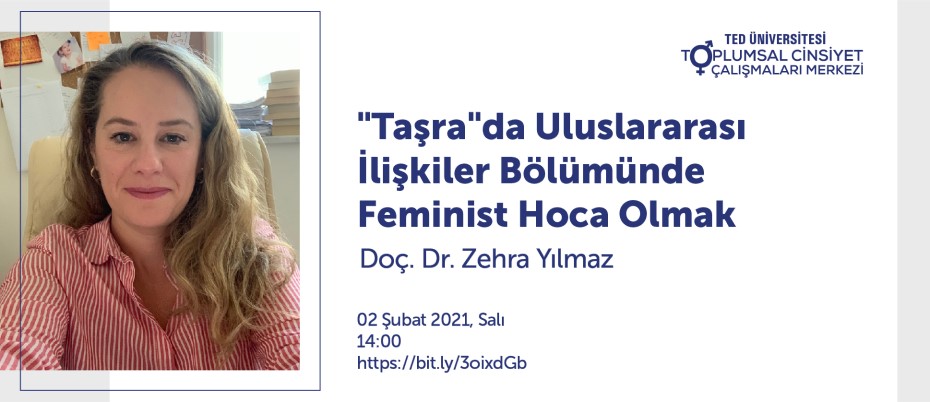
On February 2, 2021, a seminar titled “Being a Feminist Academic at the International Relations Department in the Periphery” with Assoc. Prof. Zehra Yılmaz was held.
“In this speech, the difference in the experience of being a feminist instructor in a masculine discipline and also in the periphery as a masculine space is discussed. For this reason, first of all, it is discussed what kind of ontological differences the concepts of ‘periphery,’ ‘international relations’ and ‘feminist’ used in the title of the talk have from each other. Secondly, it is analyzed in the context of the debates opened by feminist pedagogy, how three concepts come together in a class to create a difference in experience. Although the discipline of international relations is one of the disciplines that met with feminist theory late, there is also a ground that combines both feminism and the discipline of international relations. This partnership is the critical claim that both feminism and the discipline of international relations pioneer the ‘Western’ way of thinking. For this reason, both are labeled as containing ‘imperialist’ assumptions and being ‘orientalist’. Both have been criticized in the same context (intellectually and spatially) beyond the center/West and have been diversified (revived) accordingly. Talking and giving education in a peripheral university within a discipline and theory identified with the center necessarily contains many contradictions. Moreover, being in the far east of the periphery of Turkey, being in Van further complicates the ways of overcoming these contradictions. In this context, after giving place to theoretical discussions, my personal experiences as a feminist academic at the International Relations Department in Van are shared. Apart from the heterogeneity preceded by the universality of the concept of ‘university,’ in homogeneous classrooms where students from outside the region are the exception, most of them were educated in the traditional tribal system, sensitive to ethnic, religious, and sectarian partnerships, taking into account the centrist/Western language of international relations and the ‘outsider’ state of feminism. The tensions of teaching under these conditions and the solutions I have produced for this form the basis of my speech. There is little academic study on the orientalist nature of International Relations education in Turkey, although it is needed. Although this talk is not concerned with presenting a detailed literature and critique on the discipline and educational content of international relations, it aims to contribute to future studies on the review of international relations education in the field, in terms of conveying the tensions created by teaching at a peripheral university within a discipline and theory identified with the center aims as well.”
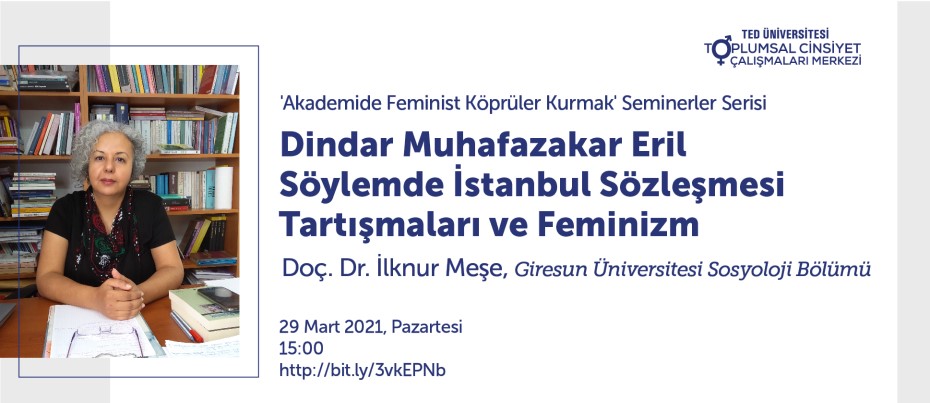
On March 29, 2021, a seminar titled “Debates on the Istanbul Convention and Feminism in Religious, Conservative and Masculine Discourse” was held with Assoc. Prof. İlknur Meşe from the Department of Sociology at Giresun University.
“The Istanbul Convention was canceled by the Presidential Decree on the night of March 20. For about two years, newspapers, magazines, associations, foundations, theologians, politicians, and lawyers, including the religious conservative masculine block, have been making black propaganda about the abolition of the Istanbul Convention. Some journalists will not be settled with this decision of cancellation. They wrote that CEDAW and Lanzarote were next. In their objections to international conventions including the Istanbul Convention, they used terms such as ‘terror, attack, occupation, trap, operation, project, external forces’ aimed at threatening the sense of security as well as terms that appeal to pedagogical predispositions such as ‘basic values, beliefs, happiness, chastity, fitrah, and faith.’ They demand an immediate exit from the Istanbul Convention and other international conventions, the encouragement of early marriages, the establishment of a family commission in the Parliament and a commission to combat feminism, the preparation of a new family law, and the Anatolian Convention, the re-teaching of Islam, the so-called defense of children, fathers, and the family. They raise their voices not only on the Istanbul Convention, but also on many things, including education, law, and administration, which are accused of being of Western origin, and demand that the whole of social life be shaped into Islam. They seek to impose their own Islamic understanding, their self-defined understanding of family, society, education, and the government as the only discourse of truth. They articulate the imagination of an Islamic society composed of submissive Muslim women who recognize the authority of Muslim men and men who are in power in the family, society, and government. With the knowledge and consent of the power, they resort to the way they want to do what they want by creating artificial tension fields and igniting the known polar plasmas. With the abolition of the Istanbul Convention, the fact that social changes we experience such as the change in the states of men and women, and the change and diversification of the states of femininity and masculinity in religious phases have become impossible to hold, and the discomfort felt from the increase in sociological meeting points, especially between religious and secular women through feminism - manifests itself through antagonism. The fear of the dissolution and loss of strong identities, which clash because of what they have created, worries them. The abolition of the Istanbul Convention is a sad outcome of the increased the reflex to cling to traditions and religion due to the economic crisis which emerged due to the pandemic and has become unsolvable by the government rendering one step ahead uncertain and unstable, and the calculated union of the government’s desire to continue its power and religious conservative masculine bloc’s dream of power regarding women’s rights.”
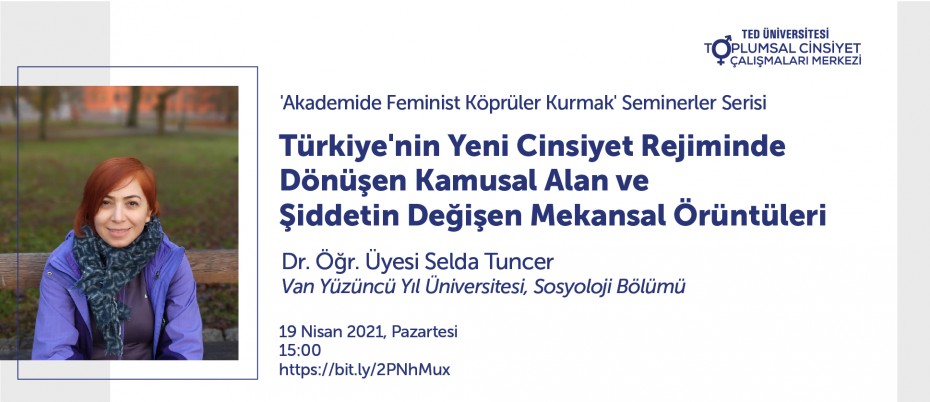
On April 19, 2021, a seminar titled “Transformation of Public Sphere and Changing Spatial Patterns of Violence in Turkey’s New Gender Regime” was held with Asst. Prof. Selda Tuncer from Van Yüzüncü Yıl University, Department of Sociology.
“In this presentation, the consequences of the redefinition of the boundaries between the private and public spheres of the patriarchal control mechanisms that have expanded in line with the new gender regime that emerged with the neoliberal conservative administration in Turkey will be discussed. With this virtue, the question of how it was established together and the chances it went through in political periods will be discussed from a historical perspective. Then sexist attitudes and explanations towards the public appearance and behavior of women who do not fall off the agenda, and how the public space turns into a space of anxiety for women as a result of the increasing attacks on women as men they do not know on the street will be explored. Finally, in this context, the spatial patterns of male violence that change from private to public, as the patriarchal oppression and control mechanisms overflow from house to street, will be discussed.”
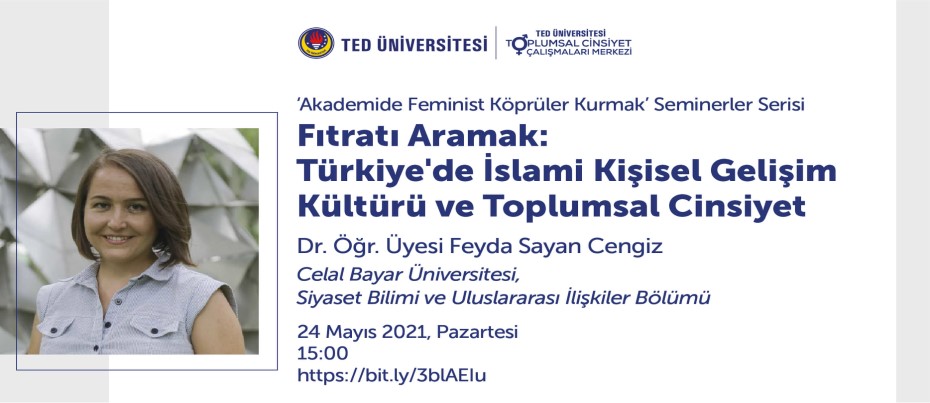
On May 24, 2021, a seminar titled “Seeking Fitrah: Islamic-Oriented Self-Help Literature in Turkey and Gender” was held with Asst. Prof. Feyda Sayan Cengiz, from Manisa Celal Bayar University, Department of Political Science and International Relations.
“Personal development books, written with Islamic references, are on the bestseller lists in Turkey today and are becoming increasingly popular with the claim of being a guide for the pursuit of individual happiness in harmony with the Islamic lifestyle. The findings of a study examining the Islamic personal development culture in Turkey through the discourse analysis of the aforementioned type of books are shared.1 In this context, the Islamic personal development culture, which became popular in the 2010s, is viewed from the perspective of gender. Islamic self-development books intertwine references to Islamic sources with references to Western-based secular developmental culture and ‘New Age’ spirituality, bringing together the ‘self-directed subject’ of neoliberalism with the discourse of neoconservatism’s feminine nature. The gender difference is naturalized under the concept of ‘fitrah,’ and it is argued that the way to reach happiness by reaching the ‘essence’ of the individual is to seek and find the fitrah, to keep it alive, to protect it from degenerating ‘alien’ effects, to accept it and to act accordingly. Correspondingly, the experience of a healthy and happy female subjectivity can only be possible within the framework of the concepts of motherhood and family. Islamic personal development books advise women not to step outside their fitrah and to establish mechanisms of self-control and self-discipline to push themselves to the limits of it.”
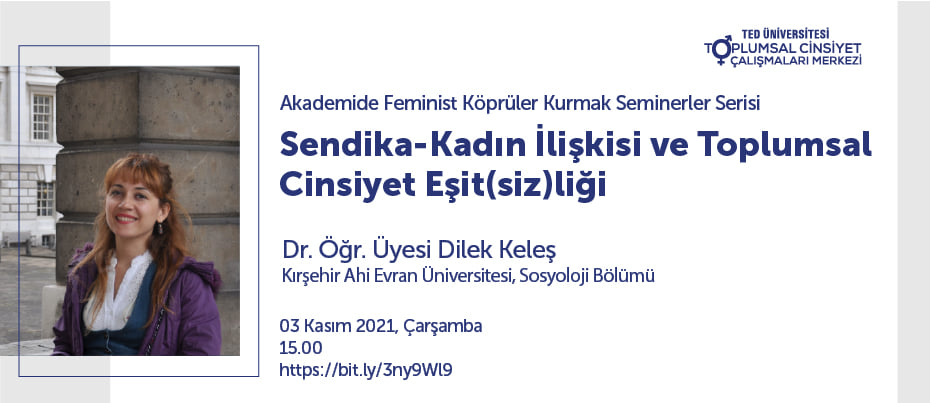
On November 3, 2021, a seminar titled “The Relationship Between Unions and Women and Gender (In)equality” was held with Asst. Prof. Dilek Keleş from Kırşehir Ahi Evran University, Department of Sociology.
“Unions, as one of the main actors in working life, play an important role in the emergence of a more equal and democratic working life and thus society. As the largest organization of civil society, unions have the power to influence governments easily and when they can establish direct relations with the parties, they function as an important pressure group in the realization of pluralist democracies. The social objective of unions, which derive their power from the collective action of the masses, is to prevent poverty, ensure equality and promote political and industrial democracy as well as civil and democratic rights. However, since the emergence of the unions, it has been seen that they do not have very egalitarian and democratic structures within themselves due to their male-dominated characteristics and organizational limitations. It is possible to say that especially gender-based discrimination segregates male and female members sharply, and that women do not have equal opportunities and conditions with men in terms of membership in unions, participation in union activities, and representation in the management bodies of unions. The unequal and sexist structure of the unions affects women who are already hesitant about union membership and turns into a factor that feeds this existing inequality. In this context, the seminar will focus on the relationship between women and unions and the linguistic and actional practices through which they exist within the masculine structure of unions, and their relationship with awareness of gender discrimination, and for this purpose, interviews with women unionists will be presented as examples.”
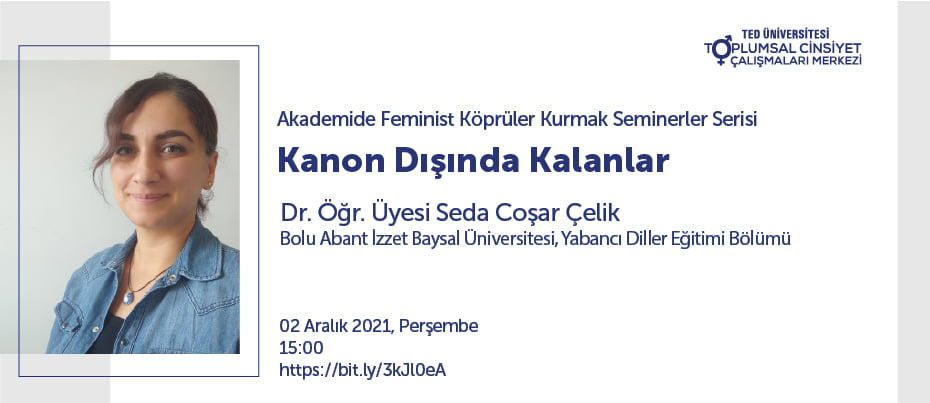
On December 2, 2021, a seminar titled “The Ones Who Are Left Out of the Canon” was held with Asst. Prof. Seda Coşar Çelik from Bolu Abant İzzet Baysal University, Department of Foreign Language Education.
“Considering the impossibility of discussing all the sub-headings that can be gathered under the main heading of ‘Women and Literature’ together, I have chosen to limit the scope of this talk to three subheadings: 1. Woman as a writer 2. Woman as an image 3. Woman as a reader. Likewise, due to the multidimensionality of each subheading, I will discuss these three headings in the context of three women writers in Victorian English Literature who, despite being among the bestsellers of their time, have been forgotten and left out of the canon since the beginning of the 20th century: Mary Elizabeth Braddon, Ellen Wood, and Margaret Oliphant. Even though all three novelists were novelists whose names were known by everyone and so prolific enough to push the limits of the mind, they could not find a place for themselves in the 19th-century literary canon. Although it is difficult to talk about the exact reasons for this neglect, I will try to address the possible reasons in the context of the sensational female characters created by these writers, the impact of these characters on the female readers of the period, their occasionally hurtful interactions with the critics of the period and with each other, and the high literature-low literature debate.”
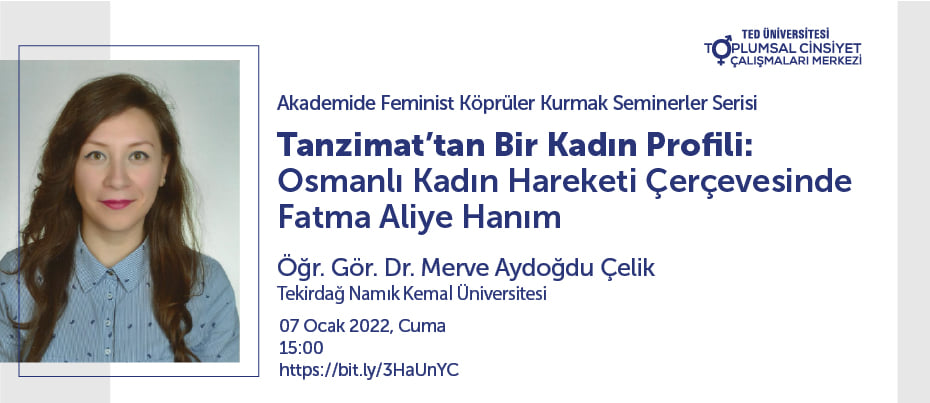
On January 7, 2022, a seminar titled “A Profile of a Woman from the Tanzimat Period: Fatma Aliye within the Framework of Ottoman Women’s Movement” was held with Lecturer Dr. Merve Aydoğdu Çelik from Tekirdağ Namık Kemal University.
“Although the visibility of women in the Anatolian geography is mainly associated with the Republic, it is seen that the social status of women was also taken into consideration in the last century of the Ottoman Empire. The Westernization and modernization movement, which began to spread to every field in the Tanzimat Period, was also effective in the woman question. One of the first women to write on this issue was Fatma Aliye Hanım. Fatma Aliye Hanım presented pioneering ideas in the context of her period by addressing women’s problems in areas such as marriage, divorce, working life, and education in both her articles and novels. Fatma Aliye Hanım is also an important figure in Turkish literature as she is the first female novelist. Within this scope, the speech will first discuss the women’s movement in the Tanzimat Period in general terms, then focus on Fatma Aliye Hanım’s personal life, and finally, the author’s novel Refet will be evaluated within the framework of the social status of women and the perspective of women in the culture of the Tanzimat Period. Through the character of Refet, the teacher who gives the novel its name, the theme of women’s independence due to having a profession will be discussed. The point that is wanted to be emphasized in this speech is that the efforts to make women visible in the public sphere got off the ground in the last century of the Ottoman Empire.”
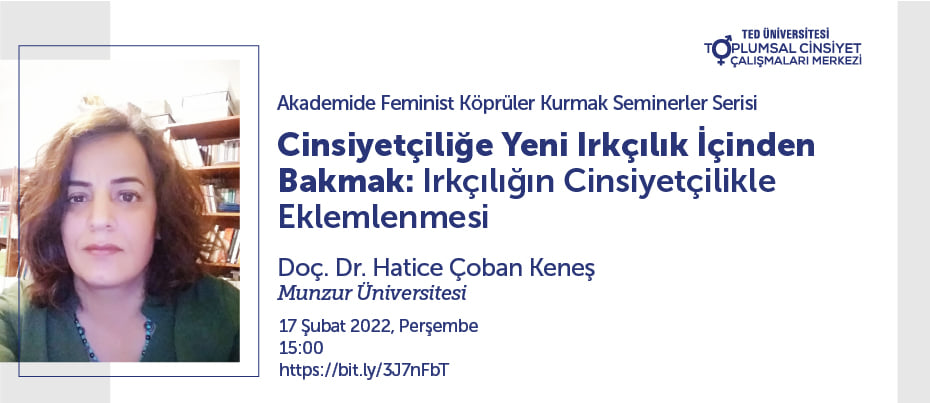
On February 17, 2022, a seminar titled “Looking at Sexism Through the New Racism: The Articulation of Racism with Sexism” was held with Assoc. Prof. Hatice Çoban Keneş from Munzur University.
“Concerning the discussions on racism and sexism, racism and sexism are considered as ideologies that arise from the same structural conditions and feed each other. In this context, the seminar will focus on new racism, which is mostly based on language, circulated through discourses, and produced indirectly and implicitly by articulating many discriminatory ideologies, and on sexism as one of the main components of new racist discourses. In the light of existing knowledge on the relationship between new racism and sexism, new racist discourses established by articulating different discriminatory ideologies over gender will be tried to be explained through current examples.”
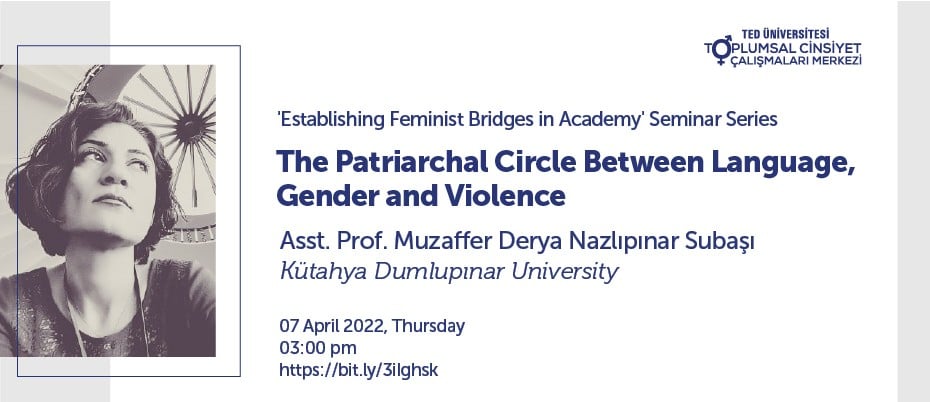
On April 7, 2022, a seminar titled “The Patriarchal Circle Between Language, Gender and Violence” was held with Asst. Prof. Muzaffer Derya Nazlıpınar Subaşı from Kütahya Dumlupınar University.
“Recent studies on women and gender have challenged the long-established definition of language proposed by linguists, who describe it as a kind of structured system to create, communicate and store information. On the contrary, as new directions and dimensions in feminist criticism have justified, language is the main force behind the construction and continuation of any ideology. Established by the privileged groups to constitute their own value system, language shapes and limits people’s interpretation of the world through reproduced ideologies, and eventually, it creates repressive and suffocating situations for the disadvantaged groups in societies. In this case, women are generally the primary victims of that oppression since they are defined and judged by the patriarchal language that imprisons them into no-choice situations. That is, no matter what ways a woman chooses to think or to do, she is condemned to lose, even in situations where she has been exposed to violence. Men’s violence against women is tolerated and even supported in many societies and cultures using misogynistic language that objectifies women’s bodies and glamorizes sexual/violence. If women resist those humiliating identifications, they are blamed and silenced as ‘they asked for it’. However, the same language that defines men as dominant and sexually/aggressive works in a different way for them, because ‘boys will be boys’. Thus, through that phallocentric way of thinking and its man-made language, more and more women are disbelieved, shamed and consequently they all fall prey to violence, physically and/or psychologically. Nonetheless, it is also possible to combat, and then stop violence by using a different language, an all-encompassing one, which offers an egalitarian basis for all sexes and genders. Considering the issues regarding the entangled relationship between language and violence and grounding its argument in post-structuralist feminist studies, in this study, I have aimed to validate that the shaping power of language can also be used to provide a source of inner grounding to eradicate men’s violence against women by implementing and internalizing gender-sensitive alternatives both in Turkish and English.”
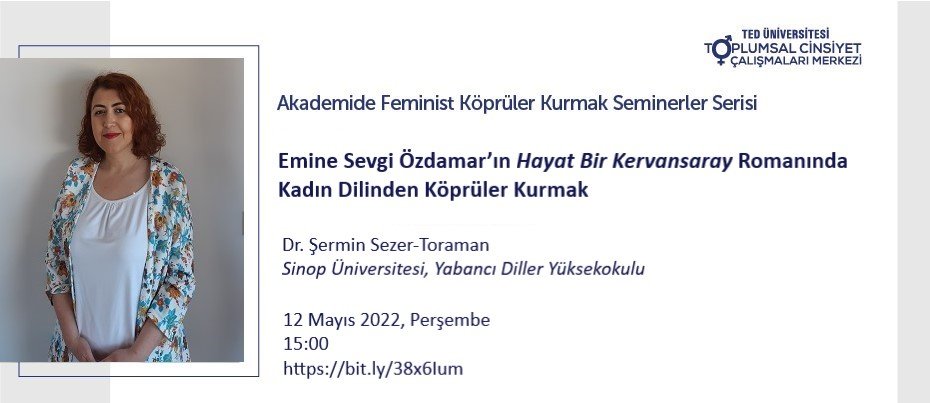
On May 12, 2022, a seminar titled “Building Bridges through Women’s Language in Emine Sevgi Özdamar's Novel Life is a Caravanserai” was held with Dr. Şermin Sezer-Toraman from Sinop University, School of Foreign Languages.
“I will discuss the issue of women and literature in Emine Sevgi Özdamar’s novel Life is a Caravanserai, which transcends the boundaries of patriarchal language and creates forms of expression with a language that is nourished by the female body. It is seen that the fact that Özdamar is a writer who immigrated from Turkey to Germany and started to write her works in German opens up a field for reading in areas such as migration, women, transnationalism, translocalism, and diaspora. In this speech, in Rosi Braidotti’s words, I will focus on the female experience by considering the context in which the main character is embedded and her bodily experience. Life is a Caravanserai is not only a novel written by a woman about women, but it also embraces different ways of being and presents various experiences together with a non-hierarchical approach by creating space in the center of the novel for those pushed to the margins by the dominant (patriarchal) language through the way it deals with events and characters. Although we tend to to evaluate the novel separately from the author’s biography, I will start my speech by talking about Özdamar’s personal life and how the author is positioned in the literary world. After outlining the background, I will touch upon the multiple intersections in the novel and explain how women from different generations, classes, and nations play a role in the child narrator’s process of becoming a subject, and I will examine how the novel opens up space for discussions on the creation of a female language and nomadic feminism within the framework of feminist debates. In conclusion, I will try to explain how the narrative that breaks down hierarchies builds bridges between different generations, social classes, and countries.”
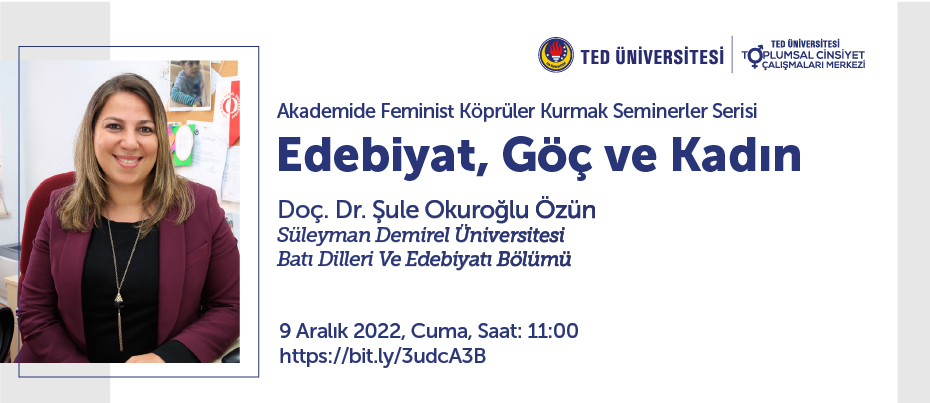
On December 9, 2022, a seminar titled “Literature, Migration, and Women” was held with Assoc. Prof. Şule Okuroğlu Özün from the Department of Western Languages and Literatures at Süleyman Demirel University.
“The roots and usage of the word ‘diaspora’ date back to ancient times, and in its simplest terms, it defines ethnic and/or religious minorities that are defined as any nation’s branch that is separated from their country. The productive dialogue in these living spaces ensures the existence of heterotopic spaces for diaspora identity. It is in these areas that the debates of ‘identity’ and the stereotyped narratives of the unchangeable self are challenged, and at different times and in different spaces, the polyphony of continuous and non-continuous selves that are in relation to the ‘other’ is embraced. When drawing the lines of diaspora subjectivity in the light of nation and border themes, it is necessary to consider women in diasporas more carefully. In the dominant colonial and patriarchal discourses, nationalist discourse made women the pure and non-historical image of subordinancy, inferiority and vulgarity while the representation of women imprisoned in the Western framework was accompanied by the cultural neglect of women. In this Western framework, men were given a dominant role, and women were described as second-class. Both patriarchal discourse and patriarchally shaped nation, homeland and guest rhetoric target female identity; thus, all other orders that can be an alternative to the desired order are suppressed. In such a case, female immigrants are doubly moved away from the essentializing center. The two-layer displacement discourses can produce a plurality of internal and external voices of existence elsewhere. Thus, the cross-cultural physical journey becomes an expanded metaphor that represents the woman’s journey to different selves. The main point here is to be able to produce many liberating alternatives such as B, C, D, rather than replacing A with non-A. This talk aims to discuss the words diaspora, identity and women and in this context to examine the selected novel of Anita Desai, who is also an immigrant woman writer. Anita Desai’s Bye-Bye Blackbird is one of the major novels about the lives of dark-skinned Indian immigrants -Madrassas, Bengalis and Punjabis- who migrated to England and were labeled as ‘blackbirds’ in England. Although it was written in the post-independence period, the traces of the colonial past and imperial power continue to shape the consciousness and spatial practices of the characters in the novel. Adit’s wife, Sarah (an English woman) also joins the marginalized Indians and faces problems such as alienation, inability to integrate and loneliness in her own society. Structurally, this novel reveals the fragmented self formation of both the migratory blackbirds Dev and Adit, who are trapped in an area where they are strangers, and Sarah, who struggles to cope with the problem of integration and alienation. In this talk, the circular life of all immigrants, which leads them to a dead end between life and death in England, and leads women to schizophrenia in Desai’s novel, which she describes as a journey of a soul seeking the perfect life, will be examined.”
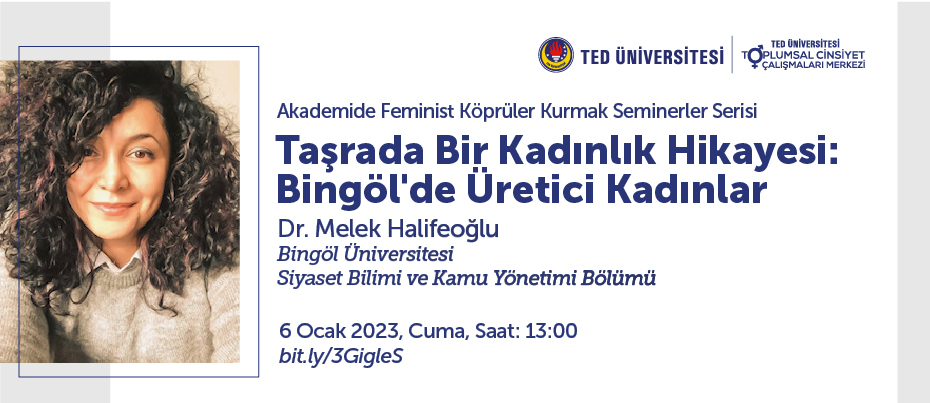
On January 6, 2023, a seminar titled “A Tale of Womanhood in the Periphery: Women Producers in Bingöl” was held with Dr. Melek Halifeoğlu from the Department of Political Science and Public Administration at Bingöl University.
“In the study carried out within the project center of Bingöl University, 20 women were given theoretical basic training on beekeeping, and they were allowed to install bee hives and produce honey in the field with an expert. The honey produced was then processed in the kitchen in the company of a food engineer and faculty members from the Department of Culinary Arts, and various products were obtained. During all these theoretical and field trainings, conversations were held about women’s relationships with their children, spouses, family and social environment. As a result of some meetings with women, the most deeply felt emotion in women proved to be trust, and the sentence that was heard many times from women was ‘being able to produce was a valuable experience.’ Women’s perspectives towards themselves and their search for meaning are among the most abstract but most meaningful outcomes of the study. In addition to the views and perceptions of women towards themselves, a survey study was conducted with the local people. Since it coincided with the pandemic process, the surveys were conducted online or by phone and then evaluated by way of the SPSS program. In this sense, at the end of the study, a three-dimensional structure composed of ‘women and family,’ ‘women and society’ and ‘women and entrepreneurship’ was obtained regarding the perception of local people, and their differences according to demographic situations were tried to be analyzed.”
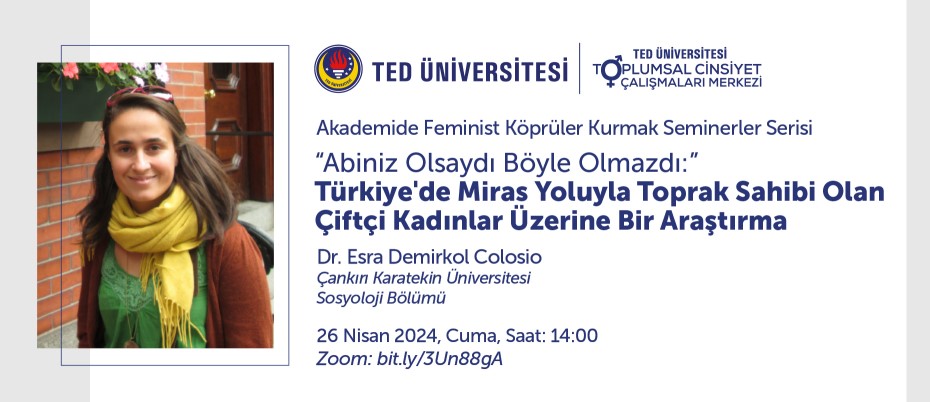
On April 26, 2024, a seminar titled "'This Would Not Have Happened If You Had a Brother': A Qualitative Research on Peasant Women Who Owned Land Through Inheritance in Turkey" was held with Dr. Esra Demirkol Colosio from the Department of Sociology at Çankırı Karatekin University.
"This presentation explores the experiences of women who have taken up or continued farming after inheriting agricultural lands in Turkey and the strategies they have developed to counter patriarchal ideology and sexist relations in rural production areas. The findings are drawn from in-depth interviews with 25 women in August 2023, with a focus on those who produce hazelnuts in Ordu and have inherited the land from their families or husbands."
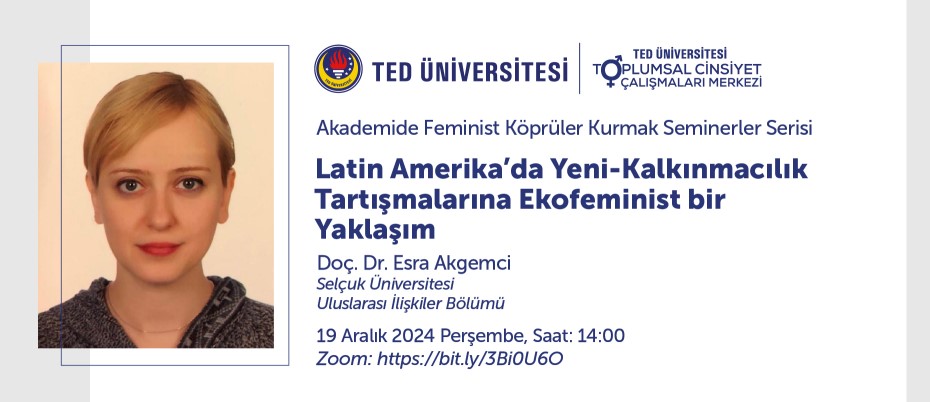
On December 19, 2024, a seminar titled "An Ecofeminist Approach to Neo-Developmentalism Debate in Latin America" was held with Assoc. Prof. Esra Akgemci from the Department of International Relations at Selçuk University.
"The process that has developed with the rise of leftist governments in Latin America in the 21st century marks a significant turning point in the region’s development discussions. Known as the 'Pink Tide,' this process has seen the emergence of the neo-developmentalist model implemented by leftists as a new form of state intervention within the neoliberal accumulation system. The neo-developmentalist model can be defined as the reconfiguration of the understanding of development, which initially evolved based on import substitution industrialization within a neoliberal framework. In this model, the state reorganizes the accumulation conditions for the internationalization of local capital. The growth and internationalization of export sectors, particularly industrial agriculture and mining, rely on a neo-extractivist strategy based on exploiting natural resources. The 'Pink Tide' governments finance their social assistance policies aimed at addressing the income inequality caused by neoliberalism and improving the living conditions of the poorest segments through this neo-extractivist model. This seminar will present an ecofeminist critique of the neo-extractivist policies implemented in Latin America. To comprehensively understand the neo-extractivist process in Latin America, where gender inequalities that have persisted since the colonial period intersect with racial and class inequalities, the intersectional perspective offered by ecofeminism is of critical importance. In this context, I will first discuss how materialist ecofeminism contributes to understanding the dynamics of capitalist development in the Global South, then examine why (neo)extractivism impacts Indigenous women the most. Finally, the struggles of ecofeminist movements in Latin America for a post-extractivist future will be addressed."
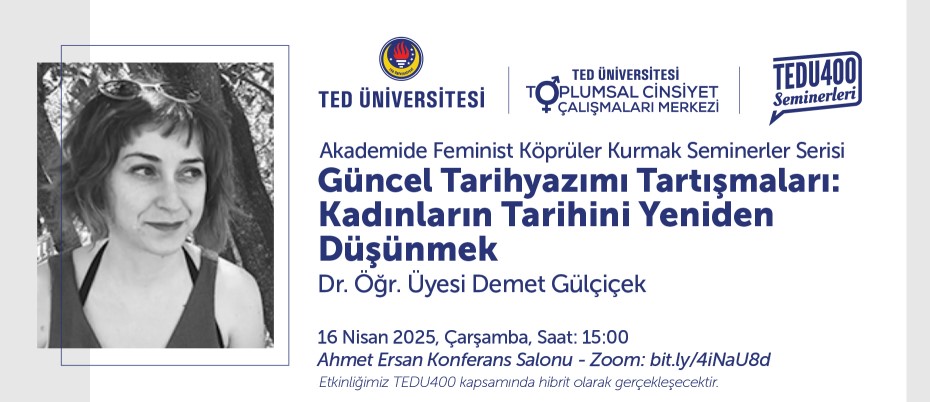
On April 16, 2025, a seminar titled "Current Historiography Debates: Rethinking Women's History" was held with Asst. Prof. Demet Gülçiçek.
"This presentation summarizes the main arguments of the book Travelling Theory and Women’s Movements in Turkey: Imagining Europe. Drawing on the conceptualization of traveling theories, it analyzes demands for women’s rights not as static but as circulating and negotiated within local contexts (Davis, 2007; Said, 1983). While feminist historiographical debates have largely evolved to write women’s history, a poststructuralist feminist approach to a ‘history of the present’ proposes to analyze the negotiations and complexities within the women’s movement by focusing on discourses. A study that undertakes such an analysis does not aim to ‘fill a gap in the literature’ or to ‘identify and correct a mistake in previous studies’; rather, it establishes relational ties with the approach to women’s history from which it methodologically diverges. The presentation will first explain the local negotiations of demands for women’s rights in the women’s movements that emerged in the early 20th century through the lens of Occidentalism theories (Ahıska, 2005). Second, it will demonstrate how the processes of modernization and nationalism, which are central to the production of Occidentalism, became intertwined with the fear that women’s chastity would be compromised. It will also show how women who demanded rights strategically referred to the category of Europe to overcome this fear publicly. Finally, it will discuss the relative spaces and normative complicities opened up for women to demand rights by relying on their position as ‘mothers of the nation’ throughout this process."
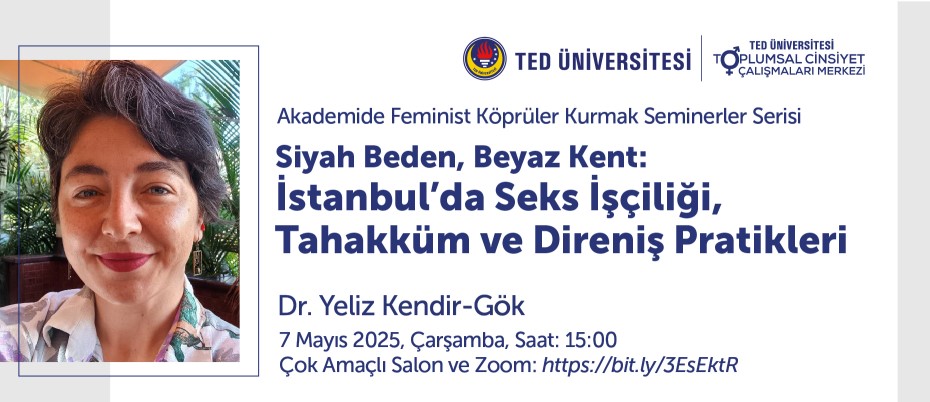
On 7 May, 2025, a seminar titled “Black Body, White City: Sex Work, Domination, and Practices of Resistance in İstanbul” was held with Dr. Yeliz Kendir-Gök.
“In this presentation, I will discuss my reasons for choosing sex work as a field of academic inquiry, how my experiences were shaped during fieldwork conducted with Black female sex workers, and the forms of domination and resistance these women encounter in a predominantly white city. I will begin by reflecting on how my witnessing of the discursive transformation surrounding the phrase ‘Russian broads/chicks’—which emerged in the 1990s in the aftermath of the USSR’s collapse and related migration flows—has enabled me to trace the personal and historical origins of my interest in researching sex work, having grown up in Hopa. I will explore how this experience has profoundly influenced my ways of thinking about issues such as the body, borders, otherness, and womanhood, framing these reflections within a sociological context. This initial curiosity, which later extended to Istanbul, has evolved into more than an academic research interest; it has become a deeply personal and existential concern—what I describe as a ‘sociological insistence.’ Subsequently, I will elaborate on the ethical and political layers I encountered in the field as a white researcher, academic, mother, and married woman, focusing on issues of access and the relational dynamics that emerged from conducting fieldwork alongside my husband. I will argue that his presence in the Tarlabaşı field site did not merely constitute physical accompaniment, but rather generated a dynamic in which patriarchal norms and protective masculinities became visible, sometimes destabilized, and at other times reproduced. In this context, I will interrogate what accompaniment means for feminist research and examine how it can be transformed into a useful tool, or even a form of patriarchal bargaining, on the path toward building inter-woman solidarity. During fieldwork in Aksaray, this solidarity took on a more tangible form, demonstrating that the research continued to draw strength from a feminist perspective. This perspective, now clear enough for me to assert that ‘yes, this is feminist research,’ provided a meaningful framework for interpreting field data. I will particularly discuss how patriarchal negotiations in Tarlabaşı emerged as hidden scripts within the experiences of Ugandan female sex workers, contributing to the complexity of their relational dynamics. I will attempt to convey, through their voices, how these women did not necessarily dismantle the domination monopolized by their clients, but rather dulled its edges through covert tactics. In doing so, I will describe how they ‘called the bear uncle,’* how they ‘used reason instead of rage,’ and most importantly, how they transformed from prey into hunters. Furthermore, I will explain how I endeavored to leverage my privileges—whiteness and citizenship—as instruments of solidarity to help Black and undocumented women navigate challenges such as language barriers and access to NGOs. In this regard, I will highlight the small yet significant maneuvers we developed in response to domination. Ultimately, I will underscore that a singular feminist research framework is not essential and argue that ‘sociological insistence’ operates as a driving force in the field.”
* This Turkish expression refers to the strategic accommodation of power in the face of structural constraints or threats.
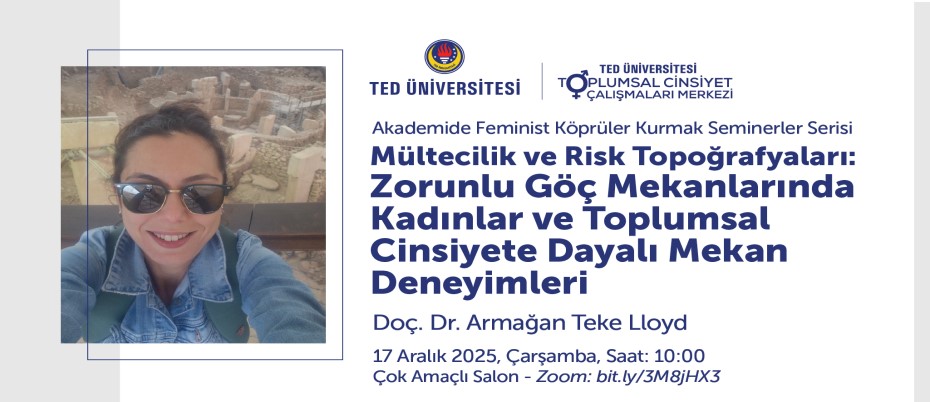
On 17 December, 2025, a seminar titled “Refugeehood and Risk Topographies: Women's and Gender-Based Spatial Experiences in Areas of Forced Migration” was held with Assoc. Prof. Armağan Teke LLOYD.
"This presentation explores how risk is spatially produced, accumulated, and redistributed in the lives of Syrian women, focusing on their experiences of forced migration due to war and earthquakes. It uses the framework of geographies of risk (Müller-Mahn, Everts, and Stephan 2018) and gendered riskscapes. Based on qualitative research conducted with Syrian women who migrated from Hatay to Kayseri following the Kahramanmaraş earthquakes (in collaboration with Prof. Dr. Ayça Kurtoğlu), I argue that risk is not a singular event but a process that layers across different spaces throughout a person’s life, linking past and present experiences. The women's narratives reveal that risk takes on various forms within multiple spatial contexts—such as the home, neighborhood, city, institutions, disaster zones, and migration routes—highlighting specific gendered dimensions like domestic violence, housing discrimination, social isolation, caregiving burdens, and post-disaster displacement. In this context, the talk critiques the spatial blindness of the international refugee regime. While this regime defines risks in terms of state borders and legal statuses, the primary risks that refugees encounter are actually produced within the spaces of everyday life—homes, neighborhoods, registration systems, rental markets, and camp environments. This disparity makes evident the fundamental areas where the regime fails to provide adequate protection. By viewing women's daily lives as the primary locations where ‘risk’ is generated, we can gain a better understanding of how these women experience the concept of risk. Our study demonstrates that the spaces in which refugee women experience loss of control, familiarity, and security (Boccagni 2017) become riskscapes for them. The research findings indicate that social networks in Hatay helped mitigate the women’s riskscapes, while isolation, discrimination, and housing barriers in Kayseri intensified these risks. Furthermore, women's efforts toward agency and empowerment involve navigating these geographies of risk. Consequently, by integrating the geographies of risk with a life-course approach, this study proposes a multiscalar, relational, and gender-sensitive framework for understanding the ever-shifting risk environments faced by refugee women."